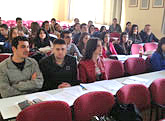 Podgorica, 28 March 2013
Podgorica, 28 March 2013
In Podgorica, Montenegro, ICTY Court Officer Ljiljana Hellman, accompanied by Outreach representative Morgiana Brading, visited Mediteran University, where she gave lectures on ICTY jurisprudence in relation to the command responsibility and the prosecution and adjudication of the crime of genocide.
At the university’s Faculty of Law, Ljiljana focussed on explaining the ICTY’s jurisprudence with regard to the legal requirements for proving the crime of genocide, stressing that specific intent was the most significant factor that had to be established. Students asked why very few of the many genocide charges brought by the Prosecution had been accepted by ICTY judges. Ljiljana explained that reasons for this included several guilty pleas in the relevant cases and the very high legal threshold of proof for the crime of genocide.
The second lecture was given to students from the Faculty of Political Science. Here, the trial of Radislav Krstić proved to be an interesting topic for a deeper analysis of genocide charges. Ljiljana explained that there is not a threshold for proving the charge of genocide based on the number of victims, and noted that the number of people targeted should be evaluated not only in absolute terms, but also in relation to the overall size of the group. The prominence of the victims within the entire group is also a useful consideration, according to ICTY jurisprudence.
There were also questions from the students about command responsibility, especially about whether effective control by a superior could ever be proven in case of paramilitary units. Ljiljana confirmed that it could and gave a few examples from ICTY cases, including that of Rasim Delić, where the judges established effective control over a group of foreign soldiers from the “Mujahedin” units that operated in Bosnia and Herzegovina.

